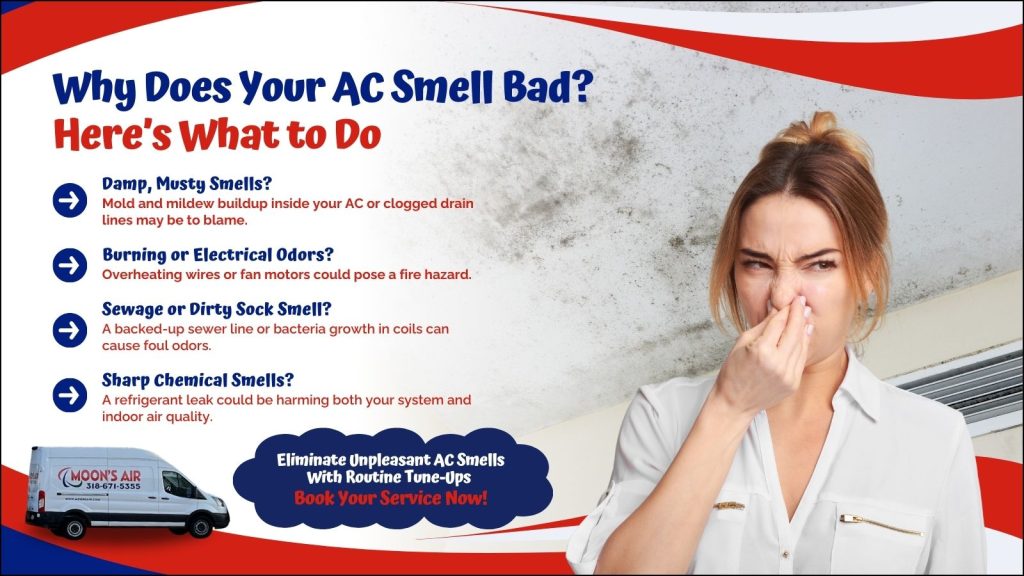There’s nothing quite as refreshing as stepping into a cool, air-conditioned home on a sweltering summer day. But what if, instead of crisp, clean air, you’re greeted by an awful smell? If your air conditioner stinks, you’re not alone! Many homeowners experience unpleasant AC odors, and these smells can be more than just an inconvenience—they can indicate serious underlying issues.
In this post, we’ll explore the most common reasons why your AC smells bad and why investing in routine maintenance and timely AC repair is the best way to keep your home fresh and comfortable.

Why Does My Air Conditioner Smell?
Different odors coming from your AC can signal different problems. Here are some of the most common AC smells and their causes:
1. Musty or Mildew Smell
A damp, musty odor is one of the most common AC complaints. This smell is often caused by:
- Mold or mildew growth in your air ducts, evaporator coils, or drip pan. The dark, moist environment inside an AC system is a perfect breeding ground for mold, which can spread spores throughout your home.
- Clogged condensate drain lines that allow water to accumulate, leading to stagnant moisture and bacterial growth.
2. Rotten Egg or Sulfur Smell
If your air conditioner smells like rotten eggs, you might be dealing with:
- A dead animal – Rodents, birds, or insects sometimes find their way into AC ducts and perish, causing a foul odor to circulate throughout your home.
- Gas leaks – Though not directly related to your AC, a sulfuric smell could indicate a natural gas leak near your HVAC system. If you suspect this, leave your home immediately and contact your gas company.
3. Burning or Electrical Smell
A burning smell when you turn on your AC could indicate:
- Overheating components like fan motors or wiring, which may lead to system failure or even fire hazards.
- Dust burning off if it’s the first time you’ve used your AC after a long period, such as at the start of summer. If the smell persists, it’s time to call a professional.
4. Sewage or Dirty Sock Smell
A strong sewage smell coming from your AC might be due to:
- A backed-up sewer line – If sewer gas escapes and gets pulled into your AC system, the stench will circulate throughout your home.
- Bacteria build-up in your evaporator coils, which can create a smell similar to dirty gym socks. This is commonly referred to as “dirty sock syndrome.”
5. Chemical or Vinegar Smell
If you notice a sharp, chemical-like smell, your AC might have:
- Refrigerant leaks, which can not only produce an odd smell but also pose a health hazard and reduce your AC’s efficiency.
- Excess moisture interacting with AC components, leading to a pungent, vinegar-like odor.
How to Get Rid of AC Odors: Invest in Routine Maintenance and Repairs
Ignoring bad AC smells can lead to bigger (and often more expensive) problems down the road. Here’s why scheduling regular maintenance and timely AC repairs is essential:
- Prevents mold and bacterial growth – Cleaning air ducts, replacing filters, and unclogging drain lines help keep mold and mildew from thriving.
- Extends the life of your AC unit – Regular tune-ups reduce wear and tear on your system, preventing costly breakdowns.
- Improves indoor air quality – A well-maintained AC ensures fresh, clean air circulates in your home, keeping you and your family healthier.
- Saves money on energy bills – When your AC runs efficiently, it consumes less energy, reducing your monthly cooling costs.
Final Thoughts
If your air conditioner stinks, don’t ignore it! Strange odors are often a sign that your AC needs attention. Whether it’s mold, a refrigerant leak, or a dead critter in your ductwork, addressing the issue early can save you from costly repairs and keep your home smelling fresh.
To keep your AC in top shape, schedule routine maintenance with a professional HVAC technician. They’ll inspect, clean, and repair your system, ensuring you stay cool and comfortable—without the stink! Ready for an AC checkup? Get AC repair in Bossier City, LA right away.
Contact us today to discuss any of your HVAC needs.










